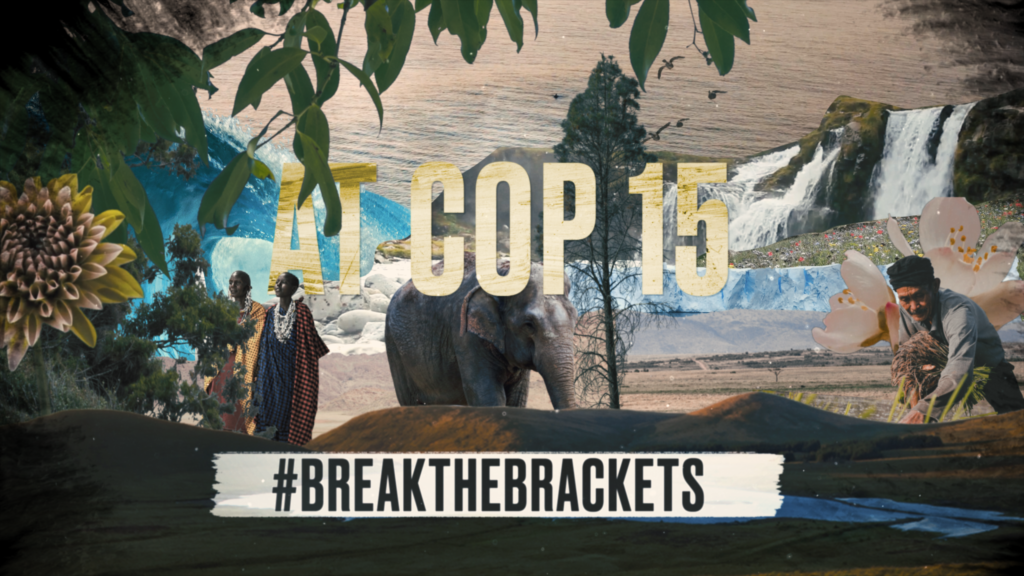
Over the next three weeks negotiators from 195 states and the European Union will meet in in Montréal at the United Nations Convention on Biological Diversity’s COP15 to finalize the new Global Biodiversity Framework (GBF).
The framework will provide a roadmap for nations which spans the next decade. It aims to set targets which will halt species extinctions, redirect environmentally harmful subsidies, mandate assessment and disclosure on nature for businesses, and ensure that the benefits we receive from nature are equitably shared.
But, while negotiations between so many parties and at this scale are always complex, the current text in the GBF stands within a convoluted maze of 1,800 brackets – each signalling a lack of consensus between countries and a failure to agree on a collective approach to protect, conserve and restore the natural world on which we all depend.
With so many key targets still littered with these brackets, many fear a watering down in ambition and an abdication of action.
But, the fact that so many key discussions are still ongoing also provides negotiators with an opportunity to strengthen current text and to deliver a truly historic framework.
While many world leaders have publicly spoken about the importance of halting and reversing the loss of biodiversity, we are currently failing to see this support trickle down into negotiating rooms where detailed discussions take place and critical text is agreed.
We need heads of state to provide their negotiating teams with clear and explicit mandates to push for a transformational agreement and to demonstrate a renewed push towards multilateralism. Parties must find common ground to deliver bold and ambitious targets and work together to remove the brackets that are blocking nature’s path to recovery, and which will erode the wellbeing of the billions of people who depend on the natural world.
A key sticking point in this negotiation, as in many, is the question of who will pay. It’s a conversation that dominated discussions at this month’s UNFCCC COP27, and it’s no less fraught when it comes to biodiversity negotiations. As was eventually agreed in down-to-the-wire talks at COP27, governments at COP15 must also commit to unlocking finance from developed countries and to direct it towards developing countries to support them in implementing the GBF.
Without this resource mobilisation, implementing the framework will be prohibitively challenging for many developing countries where most of the world’s remaining biodiversity is located, and which delivers incalculable benefits for every nation on Earth.
While negotiated by governments, the outcome of COP15 will ripple across the planet and the effective participation of non-state actors is critical. Indigenous peoples, local communities, youth, and women’s groups will attend COP15 in force. Their knowledge, rights and participation in decision-making must be factored into negotiations and communities must sit at the heart of national biodiversity strategies and action plans.
Hundreds of people from the worlds of business and finance will also be present and their participation is likewise critical if COP15 is to be a success.
Last month, over 350 companies from across 52 countries called on governments to adopt mandatory assessment and disclosure of impacts and dependencies on nature for large businesses at COP15. Recognising their critical dependence on the health of the natural world and the power of biodiversity to help them deliver their climate targets and commitments, these companies sent a clear signal to heads of state and negotiators.
Many were surprised to see businesses call on governments for enhanced regulation, but the message from those attending the COP is straightforward: the GBF must provide clear direction, specific guidance and tangible actions for the business and finance communities if they are to transform their business models and ultimately, our economies.
If mandatory assessment and disclosure on nature is ratified, the Coalition stands ready with our partners to provide the tools, methodologies and frameworks needed to empower business to drive this transformative change.
Alongside Businesses for Nature, WBCSD, TNFD, Science Based Targets Network and WEF, we have developed a series of high-level business actions on nature, known as the ACT-D framework. ACT-D guides businesses through the various tools, frameworks and initiatives available in the market to support them in assessing their relationships with nature, committing to action and target setting, transforming their practices and disclosing nature-related information.
Many of the tools and frameworks required by businesses, such as the Natural Capital Protocol, are already available or currently in development. Governments must now level the playing field by mandating their use throughout the global business and financial communities.
Change only happens at scale when disparate voices unite. We need participation in these talks from across society and the global economy, with equal representation from all corners of civil society including indigenous leaders and the private sector holding seats at the table. At COP15, we need to work together to reset humanity’s relationship with nature.
By recognizing the value provided by diverse voices and the fundamental connections between nature, people, the climate, and the economy, nation’s hold the power to deliver a framework that can transform the course of natural and human history.
We need bold leadership at COP15 next week. Our future depends on it.
This is not only a once-in-a-decade opportunity, but it may be our final opportunity to secure a just and necessary transition to a nature-positive economy, to restore what we have lost, and to protect the remaining wonders of the natural world and the people who depend on them.
1,800 brackets stand in the way of this future. Will negotiators find the strength to break them?












